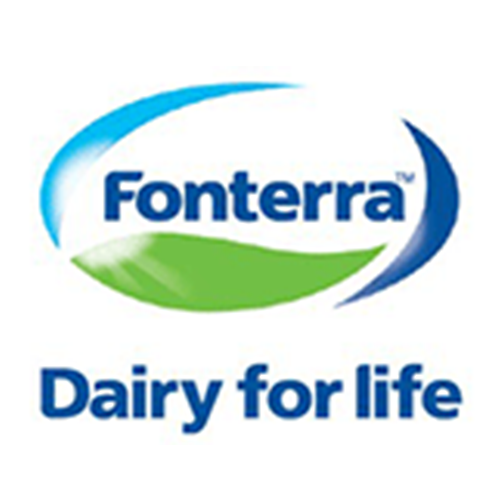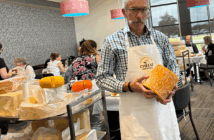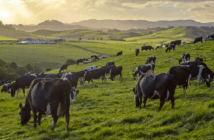 By Fonterra’s Director for Category, Strategy & Innovation, Mark Piper
By Fonterra’s Director for Category, Strategy & Innovation, Mark Piper
A new analysis released confirms New Zealand dairy farms have the lowest carbon footprint in the world.
The report from AgResearch, commissioned by DairyNZ compares New Zealand with 17 other countries. It confirms New Zealand dairy’s footprint is 70% lower than the global average and 46% lower than the average of other countries in the study, which includes all major milk producers.

Infographic credit: DairyNZ
The key to New Zealand’s lower carbon footprint is its unique pasture-based farming. As a country it has clean air, a good amount of rain and a healthy dose of sunshine – the ideal climate to grow grass. By being 96% grass-fed New Zealand’s cows exhibit more of their natural behaviours, they have reduced diseases and on average they live longer. That in turn means the milk they produce is healthier – grass-fed cows produce milk that’s naturally packed full of calcium, B vitamins, and many other nutrients and minerals.
It’s clear that consumers are increasingly interested in the origin and carbon footprint of their products and this report confirms New Zealand dairy’s well placed to meet people’s desire for food that’s kinder to the planet.
That’s why innovation is a key part of Fonterra’s strategy and why the co-op has multiple partnerships to develop the tools and solutions needed to support farmers, particularly in areas where they face tough challenges, such as reducing methane emissions. Last year Fonterra gave its farmer suppliers a helping hand by providing them a greenhouse gas emission report specific to their farm.
But finding a solution requires more than just hard graft from the Co-op’s farmers, and solutions like Kowbucha, seaweed and feed additives like Royal DSM’s Bovaer are being investigated for potential breakthroughs in reducing emissions from cows.
Fonterra has also teamed up with Nestlé and DairyNZ to expand a promising plantain trial to help improve waterways and reduce on-farm greenhouse gas (GHG) emissions.
Of course, more needs to be done to keep improving, but we’re up for the challenge and we’re already on our way.
Mark Piper is Fonterra’s Director for Category, Strategy & Innovation and has been with the Co-operative for more than 20 years in different parts of the business. He leads Fonterra’s Palmerston North-based Research and Development Centre (FRDC) – home to more than 350 researchers, engineers, nutritionists and scientists from 46 different countries, with more 4,500 years of combined dairy experience.






























































































